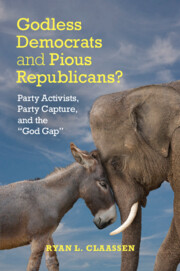Book contents
- Frontmatter
- Dedication
- Contents
- Figures
- Tables
- Acknowledgments
- Introduction
- 1 The Religious Divide in American Politics
- 2 Mobilization, Capture, and Misunderstood Trends
- 3 Representation and Four Forces that Shape Change Among Activists
- 4 First Force, The Effect of Being Fruitful and Multiplying
- 5 Second Force, The Effect of Voting Early and Often
- 6 Third Force, The Effect of Picking a Side
- 7 Fourth Force, The Effect of Writing Checks and Knocking on Doors
- 8 “Capture” Revisited, Representation, and Religious Activists
- 9 Conclusion
- Appendix A Coding for the Major Religious Traditions
- Appendix B Frequencies for Change Factor Computations
- Appendix C The Raw Materials for Assessing the Role of Demographic Change in the Activist Pools
- Appendix D Voter Loyalty Trend Estimates with Additional Control Variables
- Appendix E Republican Voter Loyalty Among Evangelicals and Region Versus Religion
- Bibliography
- Index
9 - Conclusion
Published online by Cambridge University Press: 05 June 2015
- Frontmatter
- Dedication
- Contents
- Figures
- Tables
- Acknowledgments
- Introduction
- 1 The Religious Divide in American Politics
- 2 Mobilization, Capture, and Misunderstood Trends
- 3 Representation and Four Forces that Shape Change Among Activists
- 4 First Force, The Effect of Being Fruitful and Multiplying
- 5 Second Force, The Effect of Voting Early and Often
- 6 Third Force, The Effect of Picking a Side
- 7 Fourth Force, The Effect of Writing Checks and Knocking on Doors
- 8 “Capture” Revisited, Representation, and Religious Activists
- 9 Conclusion
- Appendix A Coding for the Major Religious Traditions
- Appendix B Frequencies for Change Factor Computations
- Appendix C The Raw Materials for Assessing the Role of Demographic Change in the Activist Pools
- Appendix D Voter Loyalty Trend Estimates with Additional Control Variables
- Appendix E Republican Voter Loyalty Among Evangelicals and Region Versus Religion
- Bibliography
- Index
Summary
Since 1978 the Christian Right has devoted most of its energies to influencing and perhaps even capturing the Republican Party.
– Rozell and Wilcox, 1996, 259, emphasis addedSome suggest that the [Republican] party has been ‘captured’ by the Christian Right…
– Conger 2009, 1–2[I]n 1972 … the Democratic party was captured by a faction whose cultural reform agenda was perceived by many (both inside and outside the convention) as antagonistic to traditional religious values.
– Bolce and DeMaio, 2002, 7, emphasis addedA careful examination of the parties’ activist pools raises many questions about the forces behind the rise of Evangelical activists in the Republican Party and the rise of Secular activists in the Democratic Party. While it is true that Evangelicals and Seculars are now more influential in the Republican and Democratic Parties, respectively, it is equally clear that neither party is captured. In the first place, neither group is a majority in either party's activist pool. In the second, the word “capture” suggests that the groups in question out-mobilized other groups in order achieve dominance in the activist pools beyond their numbers in the electorate. But the previous chapters demonstrate that the assumption that mobilization drives changes in the activist pools is flawed. Specifically, for Evangelicals and Seculars, long-term variation in rates of campaign activism (e.g., mobilization) fails to explain their increased influence within the Republican and Democratic Parties – as measured by a group's size within a partisan activist pool (see Chapter 7). The representation-based model provides a new way of understanding the rise and fall of different groups in the activist pools and explains why partisan activist pools tend to move with their respective electorates. In addition to mobilization of activists, the rise and fall of groups in the activist pools reflects basic demographic and political trends, thus reinforcing connections between activist pools and electorates. As such, the rise of Evangelical activists on the right and Secular activists on the left need not be characterized as “capture” because neither group outmobilized other groups and, consequently, neither group is dramatically overrepresented.
- Type
- Chapter
- Information
- Godless Democrats and Pious Republicans?Party Activists, Party Capture, and the 'God Gap', pp. 158 - 166Publisher: Cambridge University PressPrint publication year: 2015



